The energy sector stands as one of the most challenging and demanding industries. Despite how lucrative this domain is, businesses in this field are less active in adopting new technologies and mostly rely on manual work. Nevertheless, the potential of artificial intelligence, with its promise of remarkable benefits, has prompted them to openly explore its capabilities and engage in testing specific use cases.
With its innovative capabilities, Generative AI in the energy industry and utilities has opened up new solutions to longstanding challenges. Compensating for a dearth of talent, facilitating sustainable energy consumption, and predicting maintenance needs are just a few examples of what it can offer to utility companies. It’s not surprising that 36% of the enterprises in the sector have already adopted the tool.
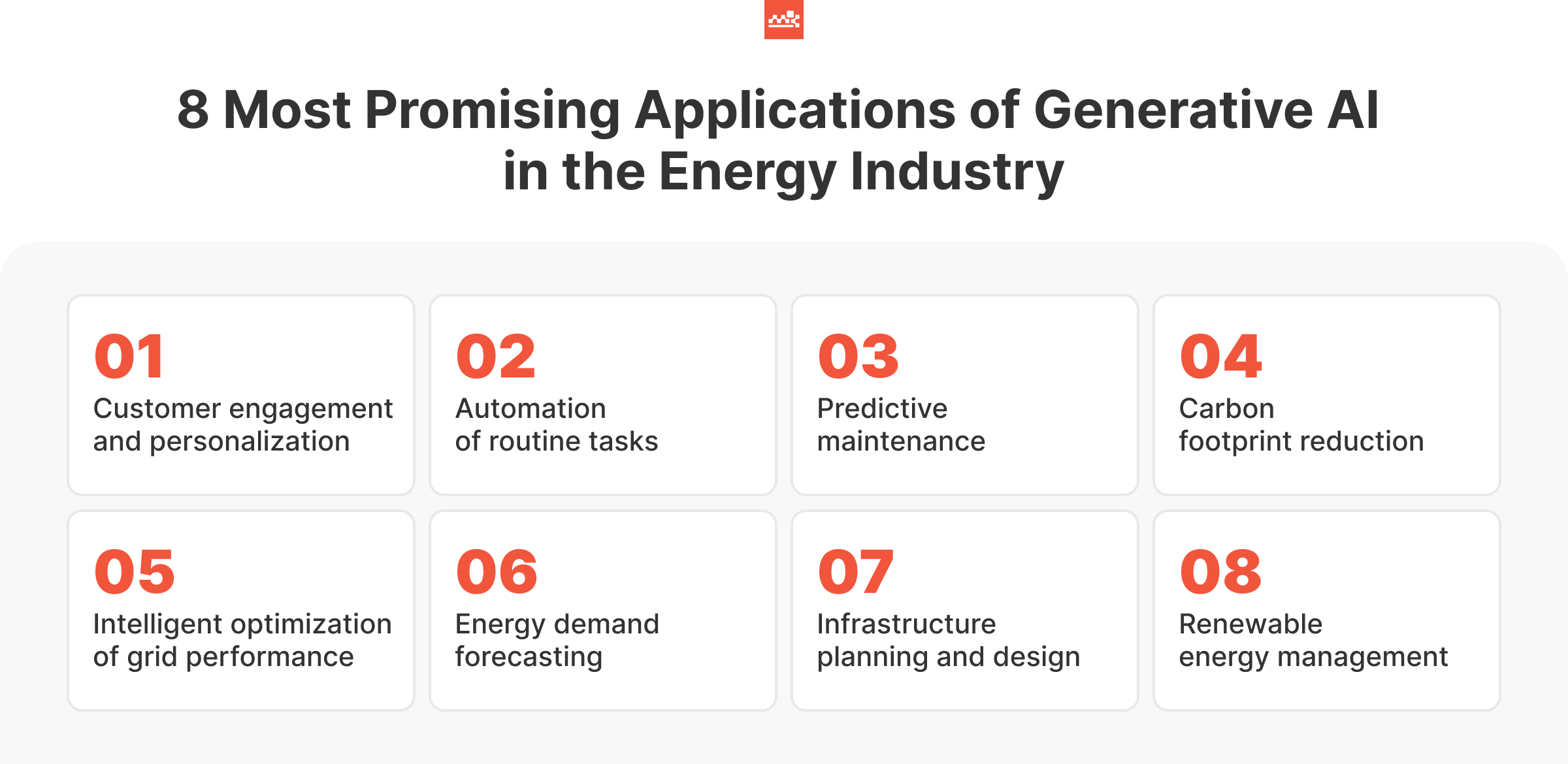
With new Generative AI trends constantly emerging, we are destined to witness significant shifts in the energy field. To lead this change, businesses should actively adopt the technology across multiple use cases. To assist companies in this transformative journey, we’ve prepared this concise guide. We will delve into top applications and present real-world examples of global leaders utilizing AI to reach new heights.
Let’s dive straight in to explore how artificial intelligence can effectively address your specific pain points.
Table of Contents
Generative AI Use Cases in the Energy Sector
Keeping the lights on has never been more complex—or more data-driven. From fluctuating consumption levels to decarbonization goals, today’s challenges demand more than legacy systems can handle. Machine intelligence is now being used to fine-tune forecasting, simplify operations, and help providers respond faster to both market shifts and infrastructure strain.
Customer Engagement and Personalization
Generative AI in the energy sector is transforming how enterprises approach their consumers. By analyzing user data, it tailors interactions to individual preferences, enhancing satisfaction. Such a method not only boosts buyer loyalty but also drives revenue growth through personalized offerings.
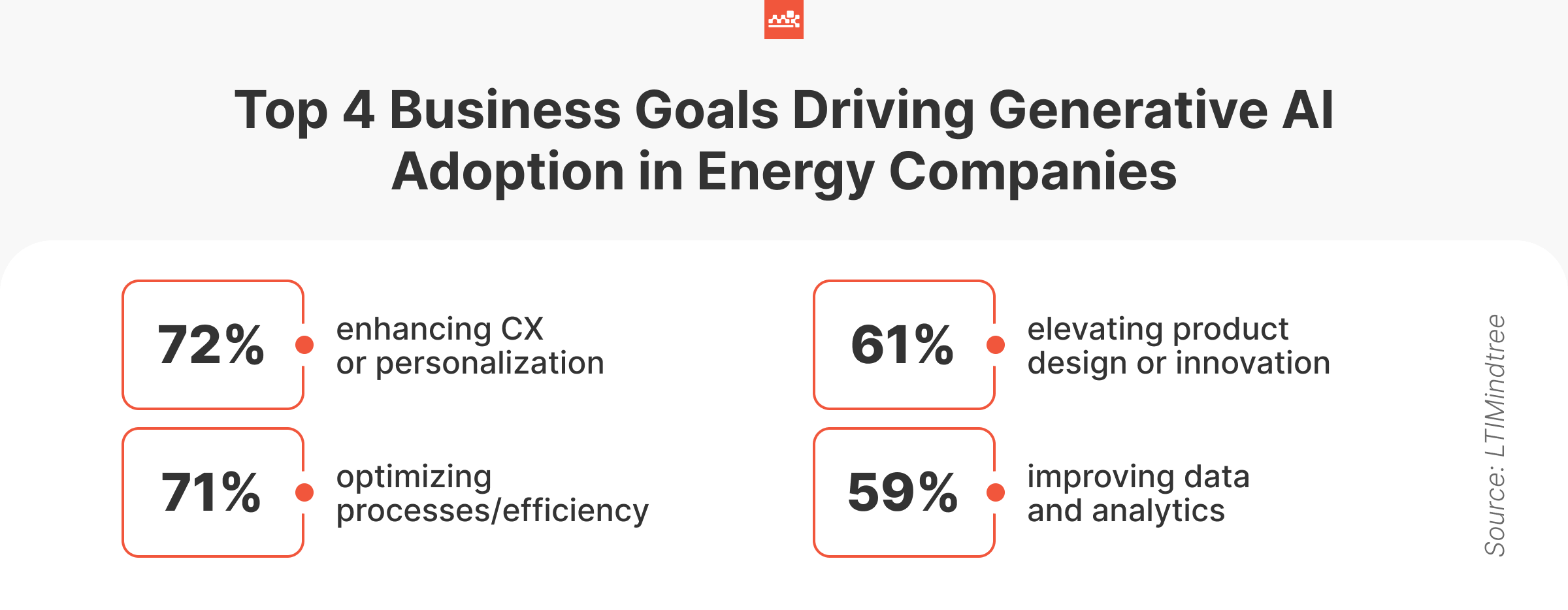
However, the integration of conversational intelligence into client care poses challenges, particularly in data privacy. The difficulty lies in offering customized assistance while safeguarding sensitive user information. Energy companies must develop robust security protocols to ensure trust and compliance. This includes transparent communication with clients about their data usage and protection.
Octopus Energy AI-Powered Emails
One of the successful examples of machine intelligence in customer service is how Octopus Energy uses the tools to respond to client emails. GenAI’s responses have attained an impressive 80% consumer satisfaction rate. It surpassed the 65% score achieved by trained human staff. The innovative use of the technology showcases its capacity to enhance support quality in this sector significantly.
And now imagine integrating GAI into bots within the energy sector. Considering the BloomsyBox eCommerce Chatbot achieved a remarkable 60% engagement rate, the potential in the utilities, with its unique customer service challenges, could be even more impactful. This opens up exciting avenues for further raising customer loyalty and retention.
Automation of Routine Tasks
In addition to personalization, GenAI is applied in the energy industry for automating routine tasks. The examples are accelerating invoice generation, payment processing, and customer account updates. This technology streamlines processes and supports complex decision-making. It allows executives to focus on strategic initiatives. Other benefits include increased productivity, more accurate financial modeling, and improved risk assessment.

The key challenge in this automation is ensuring the tool’s accuracy and reliability. Oversight is crucial for maintaining data integrity and system functionality. Companies need to establish robust validation and updating protocols for Large Language Models (LLMs) to adapt to changing market conditions and regulatory landscapes. Such an approach ensures AI’s safe and effective contribution to the energy sector’s evolving needs.
Ontario Power Generation AI Chatbot
Partnering with Microsoft, Ontario Power Generation (OPG) developed an AI-powered tool for employees called ChatOPG. The bot is designed to provide information, answer questions, and act as a personal assistant at work. Adopting artificial intelligence has helped OPG drive operational efficiencies by improving productivity, safety, and performance among workers.
AI-Powered Knowledge Base Access and Support
Field technicians, engineers, and customer service reps can now use intelligent assistants to instantly retrieve safety protocols, outage response steps, or regulatory updates—without digging through outdated manuals or siloed systems. This real-time access reduces delays, improves compliance, and strengthens operating consistency across teams.
Moreover, GenAI is able to accelerate the creation and maintenance of internal documentation. In our recent project, we saw how this technology generates high-quality support articles in minutes. Furthermore, the custom solution we built also fueled chatbot interactions with up-to-date, relevant answers drawn directly from that evolving information repository. For energy providers handling growing service demands and complex infrastructure, such an approach can facilitate faster onboarding, smarter decision-making, and more resilient day-to-day functions.
In our recent collaboration with a major US energy leader, we implemented an innovative AI-powered tool that automates the detection of discrepancies between water and oil readings. The solution, a standalone web application, visualizes these inconsistencies in an intuitive and easily digestible format, streamlining the reconciliation process.
For energy companies managing complex data sets and growing operational demands, this technology is a game-changer. It not only saves time by quickly identifying variations but also supports more informed decision-making. This results in faster resolutions, improved accuracy, and a more resilient workflow, ultimately optimizing day-to-day operations.
Also in a recent partnership with a leading energy solutions provider, Master of Code Global built an AI-powered conversational data analysis tool designed to make carbon and energy metrics instantly accessible. The agentic solution allows non-technical users to query complex databases using natural language, with the system autonomously converting prompts into optimized SQL queries behind the scenes. This interactive, chat-based interface transforms how teams access and interpret operational data—making energy and emissions insights easier to explore, act on, and share.
Internal Productivity Agents for Energy Workforce
At one enterprise tech company, employees were spending hours—sometimes days—just to locate documentation or identify the right person to contact. To solve this, we helped implement a Generative AI Slack chatbot that connected to internal systems and knowledge bases. The result? Rapid access to accurate answers, fewer bottlenecks, and significantly faster decision-making across departments.
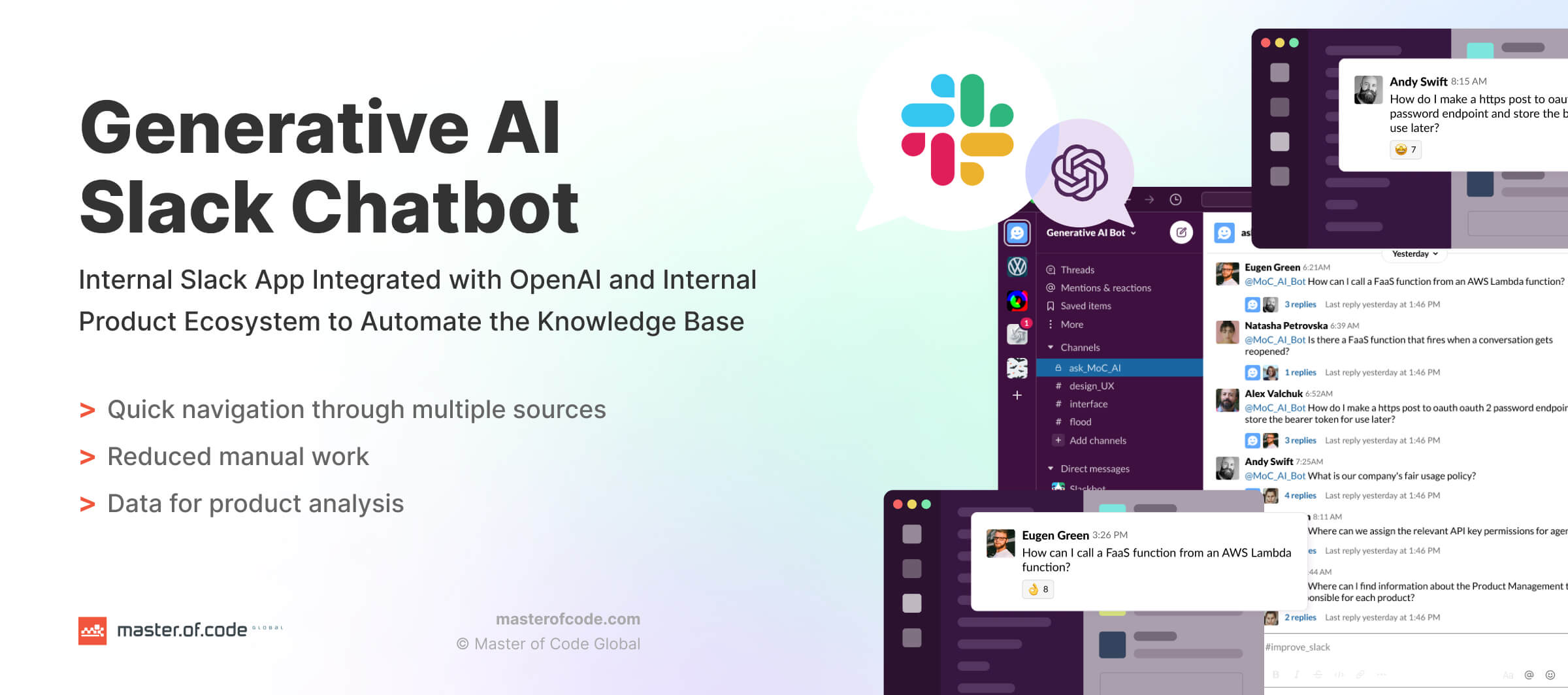
For energy providers, the impact of such internal productivity agents is even more substantial. Embedded in tools like Slack or Microsoft Teams, these assistants can retrieve equipment specs, summarize compliance procedures, or guide field teams through emergency protocols. They reduce repetitive questions, support swifter onboarding, and help distributed units operate with greater autonomy and speed.
AI in Customer Support for Energy Providers
With fluctuating prices and heightened client sensitivity, industry leaders are under immense pressure to offer timely, accurate, and personalized assistance. Generative solutions can help meet this demand. Take, for example, an LLM-driven assistants that handle FAQs, clarifies billing issues, and guides users through service changes. And it’s all done without agent intervention. These systems are working 24/7, reduce wait times, and fetch real-time usage data or outage updates from the backend infrastructure.
Beyond convenience, AI customer support in the energy sector also improves quality and compliance. NLU enables sentiment detection and routes complex cases more effectively. Additionally, transcripts and response patterns can be analyzed to guarantee regulatory adherence and identify service gaps. For providers managing thousands of interactions daily, this means lower client care costs and deeper customer trust.
Enercom’s Customer Call Analysis
An Italian gas supplier implemented a voice-based virtual assistant to manage a surge in consumer calls triggered by the energy crisis. Firstly, the solution automated responses to frequent questions. Secondly, it monitored calls for compliance with data privacy regulations. Thus, it helped the company ensure consistent, legally sound communication at scale.
Carbon Footprint Reduction
While we have explored a few impactful use cases of GenAI, its influence on the sustainability of the energy sector stands as particularly significant. In fact, 43% of executives explore it for effective environmental monitoring and management. Artificial intelligence is key to achieving sustainable practices and adhering to ecological regulations. Its role extends to analyzing emissions information and aiding in strategic, eco-friendly tactical decisions.
A critical challenge, however, is obtaining detailed and comprehensive green data. Successful carbon control through AI depends on the depth and quality of the datasets. By investing in advanced sensors and IoT technology, companies can gather more accurate and diverse metrics. This will also enable businesses to use the capabilities of artificial intelligence to upgrade environmental impact strategies.
And the application is not limited to the utilities industry only. Generative AI in automotive, for example, has equal potential to mitigate adverse climate changes. Thus, using innovations is a huge step towards a more sustainable and environmentally conscious future.
Con Edison’s AI Adoption for Sustainability
Con Edison’s use of artificial intelligence significantly lowers power generation costs and CO2 emissions. Such strategies empower clients with enhanced information and control over their energy consumption. This approach streamlines operations and promotes environmental responsibility and customer-centric service.
AI-Driven Energy Storage Optimization
As renewable energy adoption accelerates, storage systems play a critical role in balancing supply and demand. However, managing these applications at scale requires more than hardware—it demands intelligence. AI-driven energy storage solutions optimize how and when energy is stored or released, improving overall efficiency and system responsiveness. These tools continuously analyze usage trends, grid conditions, and market signals to make real-time decisions that reduce losses and boost cost-effectiveness.
Beyond performance, safety and integration are major benefits. Generative AI in the energy market can detect anomalies in battery metrics and adjust operations to extend lifespan. It also enables smoother merging with other grid assets, raising flexibility and resilience. For utilities navigating complex landscapes, these AI-powered capabilities offer a smarter path to scalable, sustainable infrastructure.
AI in Energy Procurement Refinement
This strategic sourcing is no longer just about negotiating the best rates. It’s about timing, forecasting, and minimizing risk in a volatile market. AI in energy procurement empowers utilities and large consumers to make smarter purchasing decisions by analyzing consumption patterns, trends, regulatory shifts, and even weather forecasts. These systems can predict price fluctuations, recommend optimal contract structures, and automate processes to secure favorable terms.
By using real-time data and predictive modeling, technology also helps avoid overbuying or under-procuring energy, ensuring both cost-efficiency and supply reliability. For organizations managing multiple sites or contracts, these smart tools offer a centralized, data-driven approach to sourcing. The result is reduced expenses, improved budget predictability, and a stronger position in this landscape.
AI for Renewable Energy Management and Forecasting
54% of executives also consider using Generative AI in the utilities market for green energy development and oversight. This technology enhances storage control and streamlines the operational processes in the systems. It plays a critical role in effectively managing the integration of these power sources into the broader grid.

The predictive capabilities are vital for market trend projections as well. By analyzing consumption patterns and environmental factors, AI offers precise demand forecasting. They aid enterprises in resource allocation and infrastructure management. The aspect is particularly crucial for adapting to the variability in renewable energy sources to ensure a consistent power supply.
Predictive Maintenance
Exploring Generative AI in energy and utilities further, its role in preemptive repair and asset optimization becomes clear. It’s noteworthy that 73% of executives consider utilizing the technology for these purposes. Artificial intelligence systems substantially reduce downtime, cut costs, and extend the lifespan of equipment. Such tools are known to cut maintenance costs by an average of 30% and boost machine uptime by 10–20%.
However, the challenge lies in the need for continuous information collection and analysis. Data analytics and Generative AI play a crucial role in addressing this pain point. The fusion streamlines dataset processing and increases the accuracy of predictive models. By implementing advanced solutions, energy companies can better interpret vast amounts of operational metrics. They also ensure more effective maintenance strategies and optimize asset performance.
Exelon’s AI-Powered Inspection
Exelon is using NVIDIA tools for AI training in drone inspections, augmenting grid defect detection. This method creates realistic, labeled examples for more efficient real-time assessments. The initiative aims to boost maintenance, reduce emissions, and increase functional reliability.
Improve your Generative AI knowledge with 65 use cases for effective industry applications.
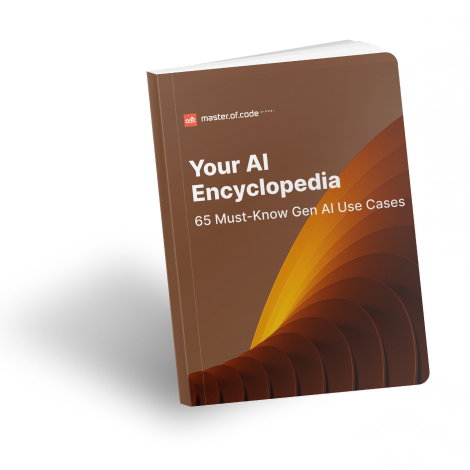
Intelligent Tuning of Grid Performance
Following the theme of sustainability, fine-tuning utility systems is another crucial use case of AI. This technology maximizes grid reliability, streamlines energy distribution, and shortens power outage durations. It also supports AI-driven grid reliability and resilience enhancement through coordinated load balancing. Such improvements lead to more efficient network management and improved customer service.
Yet, high initial costs and complexities in integrating Gen AI with existing infrastructures hinder the swift adoption of the solution. Overcoming these issues requires strategic investment and expert collaboration for seamless integration. Afterward, enterprises can support optimal grid oversight, ensuring stable and reliable energy network functionality.
Duke Energy’s AI-Driven Operational Efficiency
Duke Energy effectively utilizes artificial intelligence for inspecting infrastructure, enhancing systems resilience and regulatory compliance. Their application minimizes expenses and emissions, strengthening maintenance logistics. The company also boosts safety by lessening the need for physically challenging inspections.
Infrastructure Planning and Design
Finally, 43% of executives consider the implementation of artificial intelligence for resource allocation and supply chain optimization. Thus, Generative AI in the oil and gas industry is invaluable for infrastructure mapping and modeling. Upgrading asset distribution ensures the efficient execution of construction processes.
This technology accelerates project timelines and streamlines logistics network dynamics. It also guarantees stronger safety protocols. Forward-thinking companies leverage AI to achieve unprecedented efficiency, drive substantial savings, and ensure a competitive edge.
Generative AI Use Cases in Utilities
What if your city’s service providers could think ahead—predict disruptions, reroute resources, and respond before problems hit? That’s the promise of Generative AI in the utilities space. It’s no longer just about resourcefulness; it’s about redefining how fundamental functions adapt, scale, and serve the people who rely on them every day.
Boosting Urban Operations with AI
Municipal companies often struggle with aging infrastructure, rising demand, and fragmented data systems that make proactive planning difficult. In this context, knowing how to improve utility services in a city using AI becomes essential for both efficiency and sustainability.
GenAI and advanced analytics can help municipalities:
- Analyze usage patterns across neighborhoods to rebalance distribution loads and prevent overstrain on specific grid segments.
- Predict and mitigate low-voltage events or pipe pressure drops before they affect residents.
- Coordinate electric, gas, and water operations through shared AI models for cross-utility effectiveness.
- Automatically prioritize infrastructure upgrades based on real-time system vulnerabilities and citizen impact.
- Simulate future urban growth scenarios to test and refine long-term investment strategies.
As Generative AI in the energy sector matures, it’ll increasingly act as co-pilots—shaping smarter, more resilient environments.
AI for Water Utility Optimization
Municipal water providers face mounting pressure to conserve resources, lower overall expenses, and prevent service disruptions.
To address these challenges, many are turning to water utility AI solutions that help them:
- Detect leaks or abnormal usage patterns in real time, minimizing loss and avoiding infrastructure damage.
- Predict equipment failures in pumps and treatment systems, enabling condition-based maintenance rather than costly emergency repairs.
- Redefine energy utilization in treatment and distribution, especially in peak periods.
- Model rainfall and demand forecasts to better manage reservoirs and drought risk.
The result is a more adaptive, sustainable model that protects both supply and service quality.
Summing Up: Generative AI Implementation Roadmap
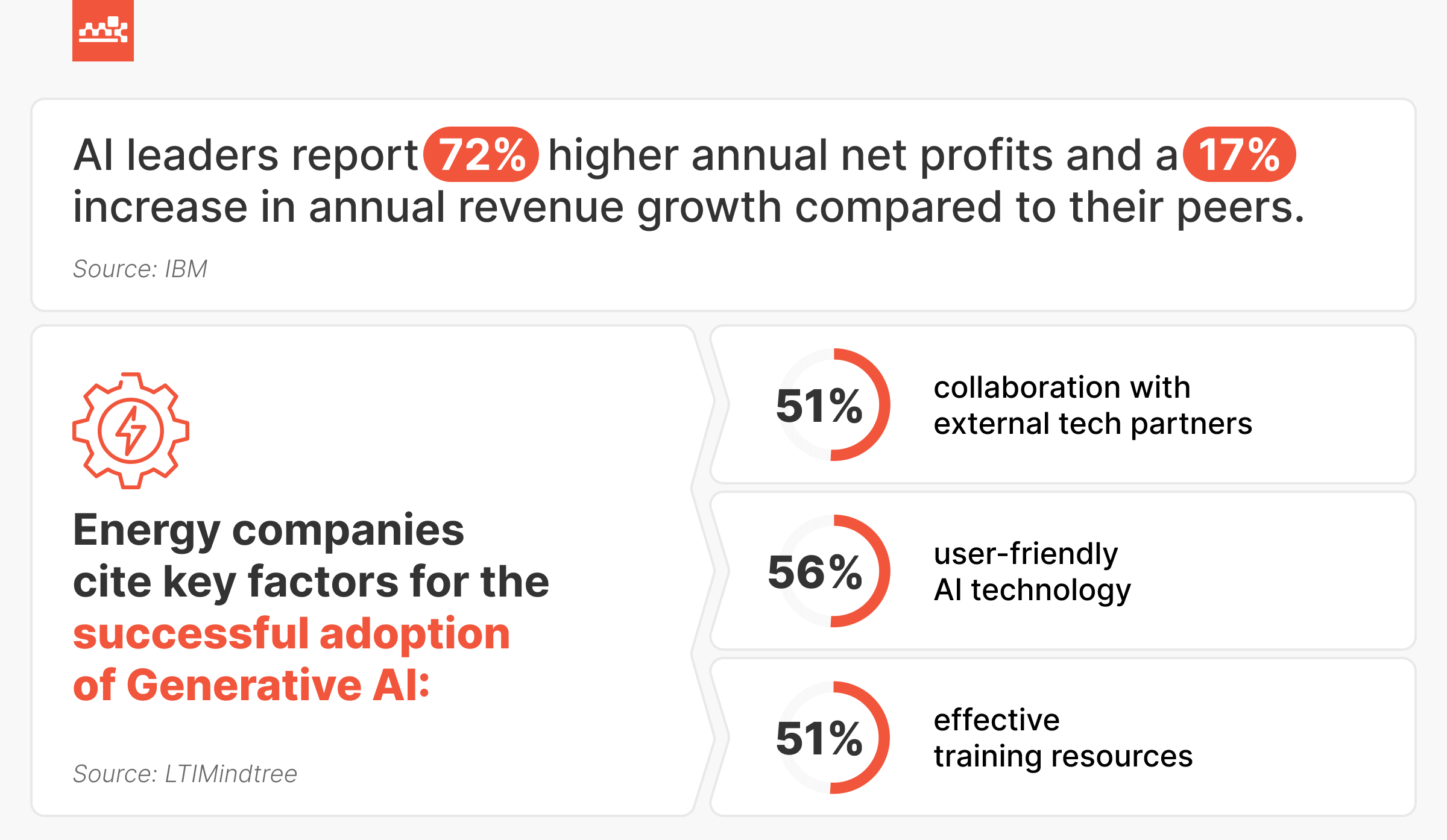
In the examples we’ve explored, companies embracing Generative AI in the energy industry witness notable benefits. They’re experiencing significant growth in revenue and net profits. Additionally, 92% of executives express plans to digitize operations through AI-powered automation by 2026. The fact underscores the increasing significance of this technology.
Sector business leaders have also identified several crucial elements for its successful implementation. Firstly, effective integration hinges on collaboration with skilled partners and user-friendly technologies. Secondly, providing adequate training and resource allocation is paramount. Proactive leadership, combined with these factors, ensures the seamless adoption and optimized utilization of AI capabilities.
Master of Code Global, as one of the leading Generative AI development companies, serves as a valuable partner, enabling businesses to meet the specified conditions. We offer tailored artificial intelligence solutions aligning with your strategic goals. Our services encompass model fine-tuning, integration, and maintenance, catering to the energy domain’s needs. We ensure a smooth transition to advanced smart applications, upgrading your infrastructure.
Are you ready to lead the sector with AI? Collaborate with Master of Code Global for custom-made tools. Let’s transform your business, focusing on intelligent performance optimization and renewable energy. Join us to elevate customer experience and boost sustainability practices in your industry.
Ready to build your own Conversational AI solution? Let’s chat!






